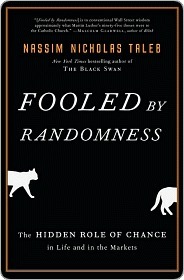More on this book
Community
Kindle Notes & Highlights
Read between
March 14 - May 5, 2023
Notice how our brain sometimes gets the arrow of causality backward. Assume that good qualities cause success; based on that assumption, even though it seems intuitively correct to think so, the fact that every intelligent, hardworking, persevering person becomes successful does not imply that every successful person is necessarily an intelligent, hardworking, persevering person (it is remarkable how such a primitive logical fallacy—affirming the consequent—can be made by otherwise very intelligent people, a point I discuss in this edition as the “two systems of reasoning” problem).
that which came with the help of luck could be taken away by luck (and often rapidly and unexpectedly at that). The flipside, which deserves to be considered as well (in fact it is even more of our concern), is that things that come with little help from luck are more resistant to randomness.
it does not matter how frequently something succeeds if failure is too costly to bear.
Mild success can be explainable by skills and labor. Wild success is attributable to variance.
Heroes are heroes because they are heroic in behavior, not because they won or lost.
As a derivatives trader I noticed that people do not like to insure against something abstract; the risk that merits their attention is always something vivid.
I remind myself of Einstein’s remark that common sense is nothing but a collection of misconceptions acquired by age eighteen. Furthermore, What sounds intelligent in a conversation or a meeting, or, particularly, in the media, is suspicious.
A mistake is not something to be determined after the fact, but in the light of the information until that point.
If an event is important enough, it will find its way to my ears. I will return to this point in time.
The same methodology can explain why the news (the high scale) is full of noise and why history (the low scale) is largely stripped of it (though fraught with interpretation problems).
No amount of observations of white swans can allow the inference that all swans are white, but the observation of a single black swan is sufficient to refute that conclusion.
But there is a more severe aspect of naive empiricism. I can use data to disprove a proposition, never to prove one. I can use history to refute a conjecture, never to affirm it.
You can more safely use the data to reject than to confirm hypotheses.
why do we consider the worst case that took place in our own past as the worst possible case? If the past, by bringing surprises, did not resemble the past previous to it (what I call the past’s past), then why should our future resemble our current past?
There are only two types of theories: 1. Theories that are known to be wrong, as they were tested and adequately rejected (he calls them falsified). 2. Theories that have not yet been known to be wrong, not falsified yet, but are exposed to be proved wrong. Why is a theory never right? Because we will never know if all the swans are white
A theory that does not present a set of conditions under which it would be considered wrong would be termed charlatanism—it-would
He refused to blindly accept the notion that knowledge can always increase with incremental information—which is the foundation of statistical inference. It may in some instances, but we do not know which ones.
I speculate in all of my activities on theories that represent some vision of the world, but with the following stipulation: No rare event should harm me. In fact, I would like all conceivable rare events to help me.
Induction is going from plenty of particulars to the general. It is very handy, as the general takes much less room in one’s memory than a collection of particulars. The effect of such compression is the reduction in the degree of detected randomness.
Remember that nobody accepts randomness in his own success, only his failure.
The problem is that a finding of absence and an absence of findings get mixed together. There may be great information in the fact that nothing took place.
My lesson from Soros is to start every meeting at my boutique by convincing everyone that we are a bunch of idiots who know nothing and are mistake-prone, but happen to be endowed with the rare privilege of knowing it.
attribution bias. You attribute your successes to skills, but your failures to randomness.


